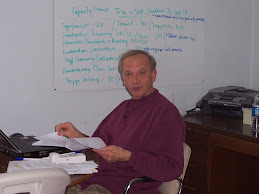Is not the day of the Lord darkness, and not light? Is it not very dark, with no brightness in it? I hate, I despise your feast days, and I do not savor your sacred assemblies.... But let justice run down like water, and righteousness like a mighty stream. - Amos 5:20-21, 24
The Christian Community, the ecclesia is made up of those who take up that messianic practice of Jesus and use it to create social relationships of a community of brothers and sisters... - Gustavo Gutierrez
I enjoyed being a commissioner to the 218th General Assembly of the Presbyterian Church (U.S.A.) in San Jose, California. I learned a lot from my stand for Moderator, and relish the memory of the whole experience. My west coast trip still seems a bit surreal, like being in a bubble for 10 days. Being home is to realize I don’t have to wear a name tag around my neck to feel dressed!
The convention center is across the street from a delightful park, resplendent with purple-flowered Crepe Myrtle trees, named in honor of Caesar Chavez. From time to time during the week I would spend time there to get some respite from the pressing (but pleasant!) business of the Assembly.
The oasis was a study of contrasts. Surrounded by expensive hotels and restaurants, it was a refuge for persons experiencing homelessness. There were times, in early morning and evening, when it seemed as though the only persons in the city were badged conventioneers and persons without homes. “Two worlds,” I sometimes thought.
The Assembly was a striking illustration of the Church gathered but not in a “Church.” It was an example of the fact that our true center of worship is not in a building or sanctuary, but in the affairs of the community – in the comportment of shared relationships.
It is certainly true that the Church, as an institution, needs to be organized. But historic institutional forms such as steeples, pews, membership roles, and the like are not at the heart of what a Church actually is. At a time of great cultural shift the most important question the Church can ask is whether its form is best suited for asserting and achieving its mission in the world.
The high purpose of the Church is the proclamation of the Gospel for the redemption of humankind. Our culture is beset by the growing problem of barriers – cultural, economic, racial, and social. The great social issues of justice and human rights are matters that are now beginning to concern every citizen at the point of their own personal life. Frustrated by a sense of powerlessness, people are beginning to draw on a deep desire to see things change, to make a difference. The personal connection is in that in working together to achieve a better world, we can ensure our own future and that of our children.
Returning to my experience of being part of the General Assembly, I was struck that our process of voting on controversial issues, adopting major interpretations and proposed revisions to the Book of Order, was achieved by close election (voting margins of 53% to 47 % were the usual). This created demarcation of winners and losers on passionate issues, such as the possible ordination of gay or lesbian persons as ministers. Opinions were held by many as matters of principle and conscience.
At the same time we wished to achieve neighborhood together – a unity of purpose and common will to accomplish our mission. Yet, at our most important moments, we failed dramatically in this aspiration.
I wonder if we could have achieved more simply by reaching out, even in a symbolic way, to those marginal folk who gathered by us in the adjacent plaza. Our tendency often is to ask in the form of the question, “What would Jesus do?” That question has always struck me as superficial and tending in the wrong direction.
I would rather ask, “Why did our hearts not move us to ask the most important question of all: How might we achieve neighborhood and communion among ourselves and those, our neighbors, to our Assembly?’ I think this question matters, because by God’s own standard the success of a Church is defined by its achievement of justice and reconciliation in the world – not in the likeness of its pronouncements.
Presbyterians, of all people, know this deeply in their hearts.
Wednesday, July 9, 2008
Subscribe to:
Post Comments (Atom)

1 comment:
Carl... thanks for you reflections. It was good to see you in San Jose if only briefly. Look forward to more post from you!
Post a Comment